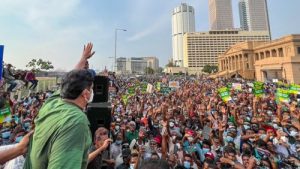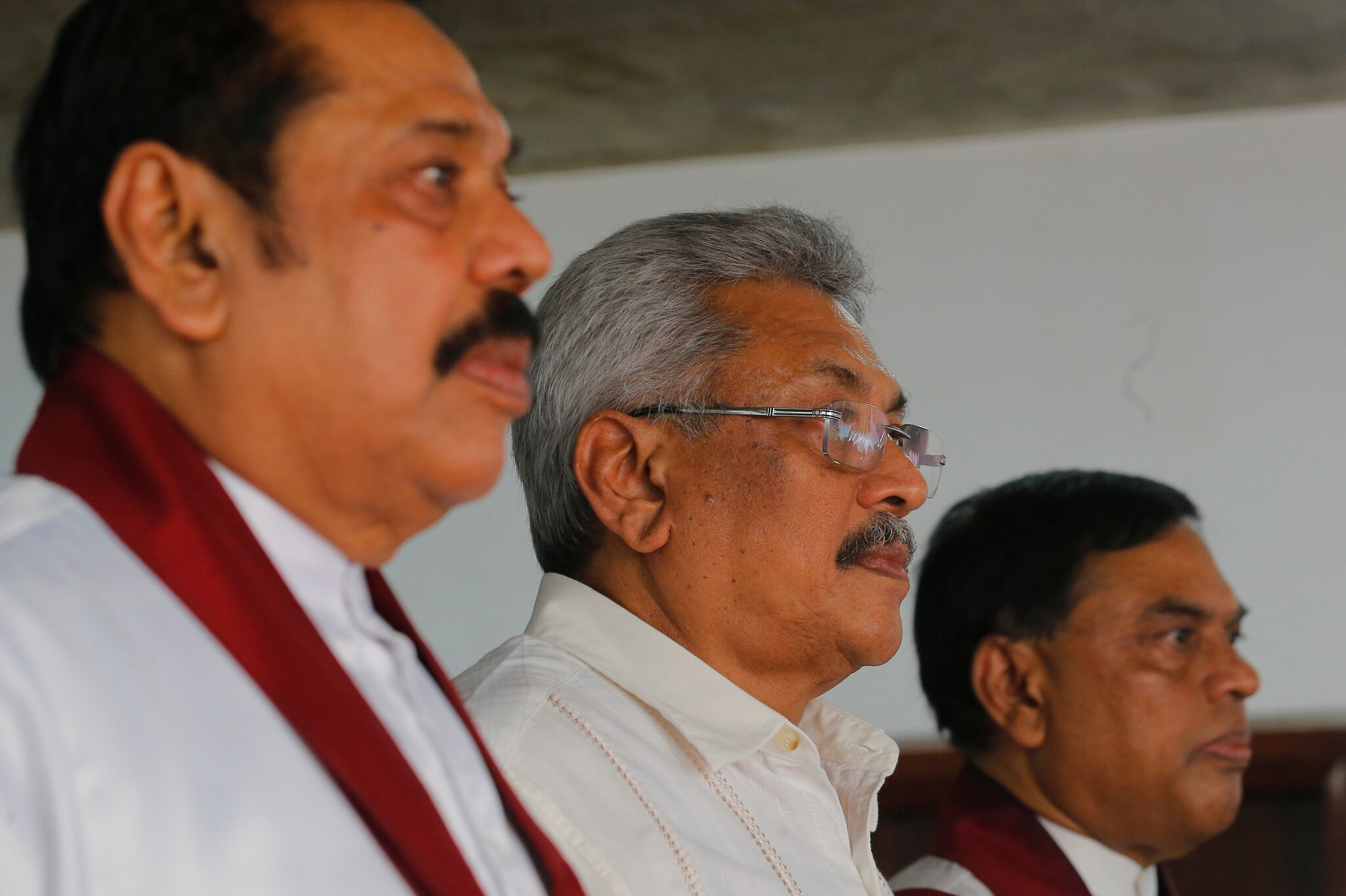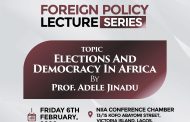By Ambassador Usman Sarki
The storming of the Presidential Palace in Colombo by thousands of Sri Lankans last month brings to mind the historic storming of the Bastille Prison outside Paris on July 14th, 1789. The Colombo insurrection brought down the Rajapaska dynasty and the government led by them, while the storming of the Bastille exactly two hundred and thirty three years ago sparked off the French Revolution that brought to an end the ancien regime in that country. While the Bastille prison contained only seven inmates, the Presidential Palace in Colombo was found deserted with President Rajapaska having being whisked away to safety elsewhere from whence he ultimately announced his reluctant resignation and fled the country.
Sri Lanka witnessed a deadly insurgency that lasted over two decades. The transition from conflict to peace and development proved too much of a strain on such a small country that depended on tourism and plantation agriculture for income, and the implosion that is now evident in the country calls for some introspection about the utility of democracy especially in balancing between rights and responsibilities and the needs of the state and the people. The thought of a country going bust as they say, and being declared bankrupt is not normally something that could be associated with reality but could only be conceived perhaps in invented scenarios or set-piece hypothetical studies.
The official declaration of Sri Lanka as bankrupt and the dethroning of the government of the Rajapaksa brothers by popular protests in the streets of Colombo should warrant our interest in mass actions in democracies. The normally calm and placid Netherlands is currently experiencing unsettling protests around a declared policy on environmental mitigation by reducing the number of livestock in that country. Many other countries have experienced popular uprisings of late to make it possible to consider this as a world changing phenomenon.

When the power of the people clashed with the people in power. The outcome was a foregone conclusion!
The homogenization of popular protests seems to have become one of the defining attributes of globalization. Without the publication and dissemination of a “Human Misery Index” by the United Nations to supplement its “Human Development Index”, we may not know exactly what are the motive forces of popular discontents and uprisings in modern societies. Attributing such actions to particular sentiments and other causalities might be rather perilous, especially when we consider the different and varying intersecting forces at play in driving such actions in different countries of the world.
The so-called Arab Spring might have been sparked off by the martyrdom of a poor Tunisian vendor, it however proved to be a potent catalyst of immense proportion in reshaping the countries of North Africa and the Middle East, whose impacts are still being felt like powerful ripples on the currents of politics of these countries. The rising tide of popular discontent and mass protests which will likely become a deluge of gigantic proportions, must therefore, be studied in the context of the dichotomy being generated by inherent contradictions in our social and economic arrangements that have invariably created alienation in the political arenas for billions of people around the world.
The term “globalization and its discontents” becomes rather appropriate when viewed within the contexts of participation versus alienation, inclusion versus exclusion, and opportunity versus deprivation. A gallivanting and out-of-control globalization that has rendered the world a global jungle of rights without responsibilities, is something to be dreaded and not wished for, particularly with regards to its relentless promotion of individualism, libertinism and consumerism.
Some have proposed the “principle of subsidiarity” as a means of countering the pervasive impacts of globalization. This principle calls for the localization of action and decision-making at the national and sub-national levels, to give effect to local needs and address local grievances directly and horizontally.
In these circumstances, the mere mouthing of democratization, observance of rule of law and human rights for example, will no longer be enough to ensure inclusivity, participation and accommodation in politics and governance, or sharing of wealth and economic benefits. More would need to be done to ensure that grievances and discontents are managed, addressed and contained before they fester and become causes of disruption of normalcy in societies.
Peter Drucker, the father of modern management practice, might feel justified in supposing that we are today living in what he termed the “age of social transformation”. According to him, it is one of those eras in history that happen once in every few hundred years, during which “within a few short decades, society rearranges itself – its world view, its basic values, its social and political structures, its arts, its key institutions”.
Such revolutions in human affairs, as Edward Gibbon would term it, now seem to happen with such frequency and rapidity that we are required to examine their inner logic, and to fathom the motives of their occurrence. Mass actions that seemed to be the precursors of uprisings or revolutions, have been taking place now for several years. In Latin America for example, military juntas were brought down my mass actions driven by the popular yearnings for freedom and democracy and an end to military dictatorships in countries like Argentina, Chile, Brazil and the like.
The protests in Seattle and Washington, DC, in the United States against the World Bank and the International Monetary Fund in 1999 and 2000, represented a middle class rejectionist response to perceived economic policies that were pursued and propagated by these global institutions, that encouraged and perpetuated inequality and pauperization across the globe. Today, such actions have become widespread and with increasing frequency across many countries and almost all the continents.
Their frequency call for an examination and understanding of their inner motive forces and what these revolutions in public discontent mean for the world. To understanding a phenomenon in any one country, the learned publicist and politician, Mr. Edmund Burke, suggested that we should study the “temper of the times”. Thus, the inner motivations or the causes of the phenomenon might be understood, and a methodical study of the issues can be undertaken with some diligence and satisfaction.
Popular uprisings in themselves are intricate and difficult phenomena to fathom. This becomes more so when they happen in what we see as rich, sophisticated and contented societies such as those countries of the Western world. The popular uprising against the state that were witnessed in France toward the end of 2018 known as the “Yellow Vest” movement was a revolt against the status quo and the French establishment.
It arose out of a sense of alienation of the people particularly in the face of rising income disparity and increasing poverty among the lower and middle classes. The introduction of taxes as recourse towards raising government revenues, and the resistance by the people tempted the activists to take direct action on the streets of Paris and other cities of France.
Several other countries including Italy, the United Kingdom, Sweden, Hungary, and many other countries in Europe also saw a fair share of mass discontents and street demonstrations in their cities. In 2020 as well, popular discontents spilled over onto the streets of the capitals of Beirut, Minsk and several cities in the United States, Ethiopia, Sudan, Hong Kong, Thailand, India, Brazil and other countries, around the world.
Protest, that innate right of citizens, has become the last resort of the masses, where democracy itself has become bureaucratized and made to conform with the established order of things. The “Black Lives Matter” or BLM movement also became a potent force in galvanizing people across countries in different continents, and coalesced opinions around the issues of racism, inequality and historical injustices by the strong against the weak.
The seeming feebleness of its earlier beginnings, and the sensitive subject around which it crystallized namely racism and discrimination against Black People in America, were deceptively marked as being the inherent weaknesses of the BLM.
However, with the aggravation of the situation in America and the polarization of the society brought about by the election of President Donald Trump in 2016, the BLM assumed a new vitality and drive, that enabled it to have a life of its own and to become a rallying point for millions not only in America but around the world. For the first time in many years, the subject of racism became a global issue that was placed on the world’s agenda against the wishes of the perpetrating countries and cultures.
The establishments in many countries were confronted by the rude intrusion of the inconvenient facts of history that have been buried under the debris of deliberate obfuscation and denial by the privileged classes, and the complacency of many societies regarding inequality was shaken to the core.
The greatest misery ever inflicted on humans, the Atlantic Slave Trade, suddenly became an issue. The statues of beneficiaries from the obnoxious trade were toppled into the abyss and accountability of banks and ruling houses in the perpetration of that historic injustice was loudly proclaimed on the streets of American cities and other places like London, Amsterdam, Brussels, etc.
Banks and commercial houses hitherto seen as bastions of respectability suddenly became odious monsters on account of their participation in the Slave Trade, in colonial oppression and the conduct of inhuman practices in the past. Who would have thought that the colossus Cecil Rhodes will one day be cast in the mold of a villain, and his legacy will be trampled under the feet of demonstrators in London? Who would ever imagine that the statue of Sir Winston Churchill, that bastion of the British establishment and hero of generations of Englishmen, will one day be insulted and called to be toppled down from its lofty and imposing pedestal?
More sacrilegious of all, who would ever conceive that one day, the statue of that monstrous megalomania, King Leopoldo II of Belgium, the “Butcher of the Congo”, will one day be toppled, trampled upon and destroyed by the masses in his own country? The twists and turns of history are sometimes mysterious and they operate in trajectories that no empirical thought can fathom. More such demonstrations of discontent should be expected from across the world in many countries.
The fact that in Nigeria nothing more that the #EndSars debacle had so far taken place should not mean that there can be no more popular uprisings in the country. The rising discontents now evident around the world especially emanating from the unprecedented measures taken against the COVID-19 outbreak as well the severe economic hardships being experienced in many countries, may finally sound the death knell of liberal democracy.
The rising discontent against the political dynamics in the United States of America and Brazil for example, and the steady decline in popular enthusiasm in elections in Europe, portend towards an end to liberal representational democracy as an option of governance, and the possible ushering in of alternative systems not based on a so-called “one-man-one vote” or government of the people, by the people and for the people, but on a system that is brought about by mass uprising fueled by discontent and anti-establishment agitation, aimed ultimately towards the toppling of the settled order of democracy.
The Western liberal democratic system of government in its different persuasions and colouration, became widespread in other parts of the world only after the Second World War, when the victorious powers imposed the system upon Italy, Germany, Japan, Spain, Portugal and other countries in Europe. The end of the War also witnessed the sudden reversal of things and the turning of the Eastern half of Europe into a totalitarian system of governance that was imposed by the USSR under Joseph Stalin, which continued unbroken until the early 1980s with the demise of the Soviet Union.
 Africa and the erstwhile colonial countries became free as from the late 1950s and early 1960s with the intensification of the anti-colonial struggle, that brought about the liberation of most of the continent from European colonial rule. Latin American countries did not fare better in this system of governance until the early 1980s when military dictatorships across the region were brought to an end by popular uprisings and turn of the political tides against military rule.
Africa and the erstwhile colonial countries became free as from the late 1950s and early 1960s with the intensification of the anti-colonial struggle, that brought about the liberation of most of the continent from European colonial rule. Latin American countries did not fare better in this system of governance until the early 1980s when military dictatorships across the region were brought to an end by popular uprisings and turn of the political tides against military rule.
China, India and most of the Asian countries pursued the system of government that they adopted after the War, with changes here and there such as in the Philippines, Burma, Thailand and Indonesia, that experienced years of military rule alternating with civil rule. Others like Vietnam, Cambodia and Laos went through painful revolutionary struggles that finally resulted in the establishment of their unique system of government based on single party rule that subsists to the present.
Against this backdrop, the “revolutions” now sweeping across Europe fueled by popular discontent with the establishment in many countries can be seen as a sort of backlash against growing fears and anxieties about the future of these countries, largely on account of sudden and unprecedented influx of migrants and refugees as any that has been witnessed since the Second World War.
The growth of anti-establishment populist movements with right-wing ideological leanings such as could be found in France, Sweden, Italy, Germany, Austria, Hungary, and other European countries, represent today an anti-democratic persuasion that has gained ground especially amidst the middle class and working class Europeans. The resultant effect is the embracing of “alternative” ideas and political movements that have hitherto been on the fringes of politics in these countries.
No longer are they cast to the sidelines and left in the shadows, but now they have taken the center stage of politics in many countries thereby portending a trend that could dramatically alter European politics and usher in a period of instability and chaos especially in relations with the rest of the world. There seems to be a manifestation of the rolling back of democracy even in countries where governments came into offices through popular elections.
The fact that rulers in countries like Brazil, the United States, Hungary, Thailand, The Philippines, and others around the world have been making resort to means that seemed inimical to constitutional rule and inherited democratic practices in their countries, indicate that the maxim of government by popular consensus is no longer sufficient to deliver law and order, and ensure other indispensable actions like the fight against insecurity, corruption and other threats to societies and countries.
While the postulation by Isaiah Berlin about “negative” and “positive” liberties may not be entirely suitable as tools for examining the spate of unrest in many parts of the world, it can be argued also that the position held by Daniel T. Griswold that globalization provides “a more fertile soil for democracy” might no longer be tenable, going by what is happening around the world today. However, if protest in itself and mass popular actions bordering on uprisings are to be seen as integral parts of democracy, then Griswold’s claim can be justified without causing havoc to our reasoning based on the evidence in our view.
Griswold asserted that many countries embraced globalization because of the “manifest failure of any alternative” as such, the embracing of globalization cannot be said to have been spurred on by any ideological considerations, according to him. One of the least discussed aspects of globalization is the Pandora’s Box of contradictions that it has unleashed in all directions. The necessity for opening up of countries versus nationalism is one great contradiction that seems to defy any reasonable remedy of balancing act by nations.
On the one hand, neoliberalism which actually set the modern phase of globalization calls for free trade and all other liberal tendencies in the global “market place”, it has fallen short of prescribing remedies to intrinsic desire of nations to also look inwards and find homegrown solutions to their domestic problems. Many countries particularly in Africa and Latin America were actually doing well in the 1960s, ‘70s and early ‘80s. However, with the ascendancy of the neoliberal agenda in the 1980s and the across-the-counter and one-size-fits-all prescription of remedies for all countries, the disastrous collapse of the economies of such countries like Nigeria, Zambia, Egypt, Venezuela, Argentina, Chile, Brazil, etc was brought about, from which some of them are yet to fully recover.
The needless accumulation of debts and the heavy burden it entailed on states forcing them to curb social services like health, education and housing support, can arguably be said to be the most palpable impact of the modern trend of globalization. Debt servicing became the most important component of many national budgets, thereby reducing the scope for the provision by the state of services like free education, social security and healthcare insurance.
Deflationary policies aimed at controlling inflation seems in many cases to fuel further problems for the economies of some of the countries that were forced to liberalize their economies. Currencies became instantly devalued and salaries and wages became insufficient in meeting the needs of workers. Production and consumption were consequently adversely affected and many economies virtually collapsed under the weight of imponderable factors which Adam Smith termed the “invisible hand” of the market.
“Civil society” itself has become enfeebled by the corruption of manners and ascendency of special interests over popular interests. The bureaucratization of civil society meant the reduction in their influence and trust among the people, thus paving the way for a loose and informal coalition of activists driven by the Internet and other social media platforms, and discussed through the communities without any center of control or direction. Such loosely organized and popularly led movements would perhaps be the order of the day in many countries, when revolutions take place and mass actions are called forth to effect changes in societies.
In the old order of things, revolutions are conspiratorial actions organised and directed by a controlling agency or hand, that operates in the shadows in secret recesses of society often underground and undetected. Nowadays, popular movements are simply organized on mass platforms like WhatsApp, Facebook and the like, where at the press of a button, thousands and more people can be reached. Information, that most important of all assets in any revolution, has now become a global commodity free obtaining hence the rapidity with which mass actions can be initiated organised and brought on to the streets of any capital in the world.
While most of the Arab countries and others like China and Russia have drawn lessons from previous popular uprisings and are assiduously endeavoring to control or neutralize the effects of social media to prevent mass mobilizations in their countries, such cannot be said about African countries or in the Western world. Attempts at blind siding activists were made in places like the Sudan, Uganda and Ethiopia for instance, when mass actions threatened the ruling class and their state apparatuses.
However, in majority of the situations such effects have not been achieved with marked results in many other countries. The events in Mali that led to the military’s intervention and forceful resignation of the erstwhile President Ibrahim Keita, the recent impasse and popular uprisings in Belarus and Thailand, the suppressed mass actions in Myanmar, Hong Kong, and the nation-wide resistance to Trumpism in the United States represented by the “Black Lives Matter” movement that also spread to other countries across the world, represented the crystallization of general discontents and apathy in most countries towards democracy and the status quo.




























